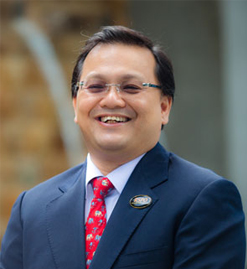 | Last year, the RT9 themed "RSPO Certified. Transforming the Market. Together." witnessed a record high in terms of attendance - over 1000 attendees from 34 countries around the world comprising grower and consumer nations, and beyond. This reflects the seriousness of all the stakeholders in the palm oil sector about the quest for sustainability. This year, the RT10 is themed: "10 years of driving sustainability. The business model of the future." The theme carries two fundamental messages. | First is that this is the tenth annual roundtable meeting organised by the RSPO. It allows us to reflect with a sense of thankfulness to the visionary individuals who had the instincts to conceive of such an initiative - conceived long before there was wide spread global mass awareness, as there is today, on issues such as environmental destruction and the impact of that to climate change, to wildlife as well as issues related to working environments, rights of communities and workers, etc. It is easy to calculate that none of these individuals while convicted, could have quite imagined the potential impact their actions will have ten years later. The idea could not have gone far without the multi stakeholder representation within the RSPO. No doubt that this diverse representation has been the basis for various differences in the past many years.
However, ironically it is this same dynamics that have allowed for the harmonising of varying interests to serve one vision in achieving much that has been. 10 years of driving sustainability for an agricultural commodity has its own attainments to speak for. I wholeheartedly thank the individuals, organisations and nations who have enabled the values of sustainable palm oil to become the bed rock of conventional and mainstream practice over time.
Secondly - the idea of focusing primarily on continuous land expansion to fulfill global demand of palm oil be it for food, oleo chemicals and bio energy cannot continue to be the business model of the future. We cannot and must not allow for it as it comes at the expense of the dignity of the world we live in. On the other hand, eradicating palm oil for the notion of protecting the environment is also a misplaced one - although admirable of those who do this out of personal conscience and principles. The demand for edible oil will continue because of the existing global need- if palm oil is no longer made to be an available option, the demand for other vegetable oils will increase. And in the longer run, this will cause even more devastation to the environment as palm oil is the highest yielding edible oil crop - which means for the same amount of palm oil, more land (perhaps up to ten times more!) has to be cultivated for the same production volume from other vegetable oils. It is simply shifting the cause of on one environmental concern to another.
As the most productive edible oil crop; most affordable; most widely produced; and most extensively used edible oil in the world, palm oil is and can be the answer to many of the prevailing global dilemmas such as poverty, food security, natural energy sources, etc. Due to its extremely high yields and the fact that it is a perennial crop, palm oil is probably the best option for sustainable agricultural development in the landscape of tropical nations. Therefore, it is not an over dramatisation to state that it is in the interests of literally everyone to ensure that palm oil continues to serve the gifts it offers; while ensuring that its detrimental consequences through unsustainable practices are discontinued. What the sector must continue to embrace, even more insistently, are sustainable business models for the future - such as the RSPO or any other standards or practices that inspire protection rather than destruction of all the elements of mother nature; flora and fauna, wildlife; the integrity of indigenous communities, workers, families and children; and the advancement of developing nations.
It would be remiss of me not to acknowledge our certified grower members for their dedication to the entire process in the past 5 years since certification began in 2008. For growers around the world, from such diverse societies to come together and embrace robust voluntary standards out of their own conviction, either commercial or compassionately driven deserves commend. There will continue to be challenges and obstacles, but we look forward to pressing ahead together with you. I am sure I can speak on behalf of our members when I convey a firm handshake to certified growers from all the other stakeholder groups along the supply chain. It is now also time to see convergence from the demand side of the supply chain in taking tangible actions towards certified sustainable palm oil.
To this end, I am delighted to announce the details for this year’s RT10 - as it is a platform to hear your views on what you think should be the business model for the future of palm oil and as a consequence, the future of human kind.
We look forward to having you present and engage with us at RT10.
Darrel Webber, Secretary General, RSPO |